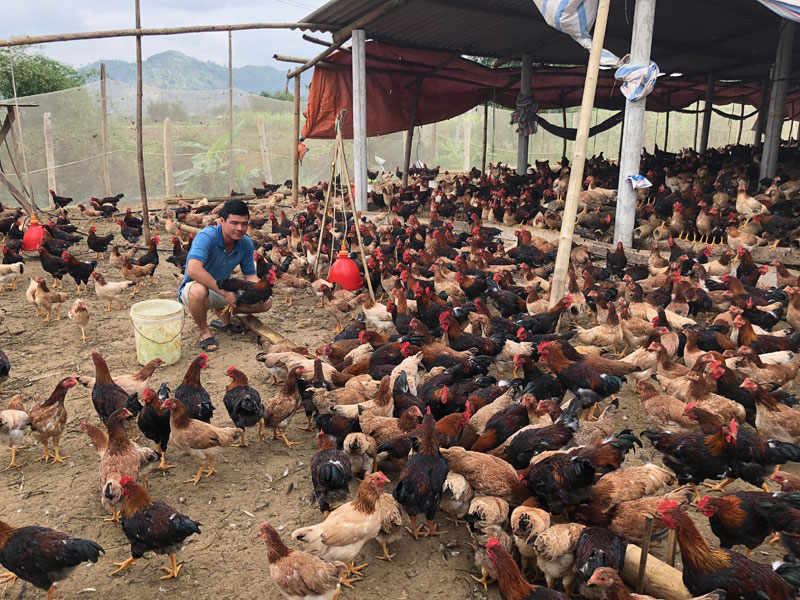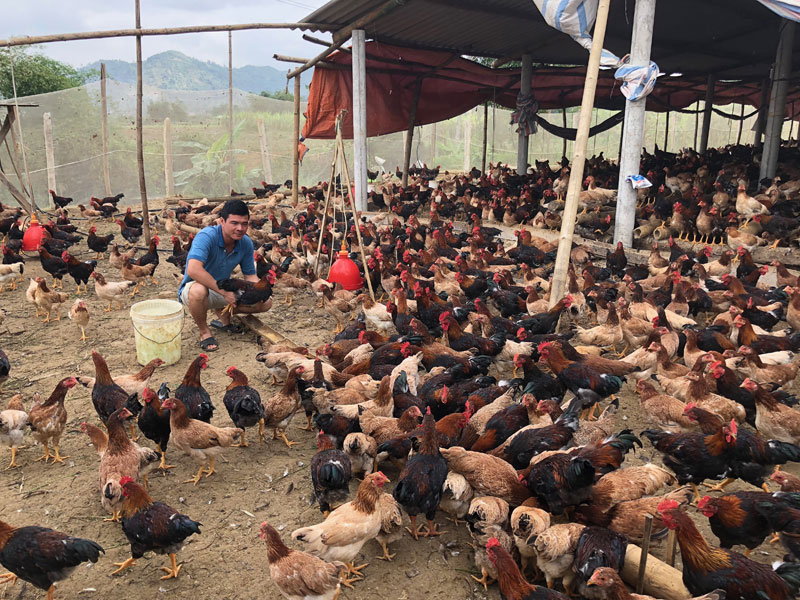
(HBO) - Social enterprises (social enterprises) in the locality are a special group of the social organizations (in the form of non-profit organizations, businesses, households, cooperatives, production groups or private enterprises) to serve unmet needs, to create jobs and sustainable income for the easily vulnerable people, the ethnic minorities, the poor, women and so on. In our province, the Project to Support the Social Enterprises for the creative and sustainable rural development (SERD Project) has been implemented by CSIP Center in cooperation with the Provincial Farmers' Association in three districts with high rate of the poor households. They include Tan Lac, Lac son and Yen Thuy districts. The project has been making positive contributions to the socio-economic development in the province.

The chicken cooperative in Dam village, Yen
Nghiep commune (Lac Son) needs the income for the production and business to
increase income and create jobs for local laborers.
The group of people who are interested in raising
indigenous chicken in Dam village, Yen Nghiep commune (Lac Son) was established
in late 2016. The group have gathered and attracted eight members. The members
mainly support each other in terms of technical knowledge, investment capital
for the production managed by themselves.
The Cooperative Group growing red pomeloes in
Tan Huong Village One, Thanh Hoi Commune
(Tan Lac) was established in 2016 with 14 members. The main activities of the
group are to help each other to share experiences in taking care of the citrus
fruit and supporting the market price information. In the group, there are 28
direct production workers (middle aged or older) who are hired by the local
members and paid daily (150,000 VND a person a day).
Similarly, the group of people who are
interested in raising chicken in the hills in Mu hamlet, Yen Nghiep commune
(Lac Son) is led by Mr. Bui Van Thiet with 5 households. The Agriculture and
Forestry Cooperative of Bao Hieu commune (Yen Thuy), managed and oparated by
Mr. Bui Quy Hoi, has also received the intervention of the project. At this
time, in the three intervention districts (Tan Lac, Yen Thuy and Lac Son), the
project has implemented the intensive support for 16 production and business
units in the fields of agriculture, service and tourism. . These are social
enterprises operating in the form of small and medium or micro enterprises,
individual business households, cooperatives, business groups with the low
income, in the remote areas.
According to data from the Hoa Binh Provincial Party Committee, the industrial production index for the first six months of 2025 is estimated to have increased by 20% compared to the same period last year. This marks the highest year-on-year growth rate for this period since 2020.
In the first six months of 2025, Hoa Binh province’s export turnover was estimated at 1.145 billion USD, marking an 18.11% increase compared to the same period in 2024. Import turnover was estimated at $ 804 million, a 17.15% increase, which helped the province maintain a positive trade balance.
The lives of the ethnic minority farmers in Tan Lac district have gradually improved thanks to the new directions in agricultural production. This is a testament to the collective strength fostered through the professional associations and groups implemented by various levels of the district’s Farmers’ Union.
With the motto the "product quality comes first,” after nearly one year of establishment and operation, Muong village’s Clean Food Agricultural and Commercial Cooperative, located in Cau Hamlet, Hung Son Commune (Kim Boi district), has launched reputable, high-quality agricultural products to the market that are well-received by consumers. The products such as Muong village’s pork sausage, salt-cured chicken, and salt-cured pork hocks have gradually carved out a place in the market and they are on the path to obtaining the OCOP certification.
In the past, the phrase "bumper harvest, rock-bottom prices" was a familiar refrain for Vietnamese farmers engaged in fragmented, small-scale agriculture. But today, a new spirit is emerging across rural areas of Hoa Binh province - one of collaboration, organisation, and collective economic models that provide a stable foundation for production.
Maintaining growing area codes and packing facility codes in accordance with regulations is a mandatory requirement for agricultural products to be eligible for export. Recently, the Department of Agriculture and Environment of Hoa Binh province has intensified technical supervision of designated farming areas and packing facilities to safeguard the "green passport" that enables its products to access international markets.



